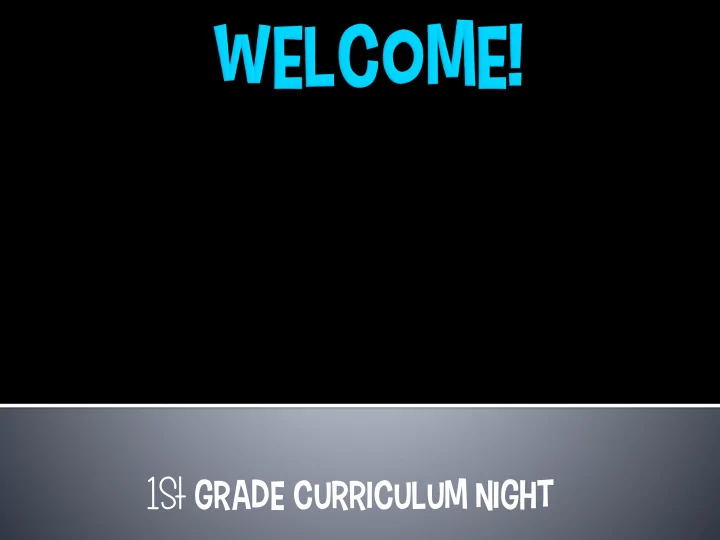

1st Grade Curriculum night
◼ Respectful ◼ Responsible ◼ Safe ◼ Kind These are the core values that will guide our behavior expectations throughout the building.
Mental Math Practice Integrated Tasks • Think flexibly • Focus on critical • Solve complex about numbers areas of learning problems • Develop accurate • Collaborate in • Build and efficient small groups perseverance strategies • Solve problems • Discuss reasoning • Explain thinking independently with others Standards for Mathematical Practice • Develop processes to engage in all math content
Make sense of problems and persevere in 1. solving them. 2. Reason abstractly and quantitatively. 3. Construct viable arguments and critique the reasoning of others. 4. Model with mathematics. 5. Use appropriate tools strategically. 6. Attend to precision. 7. Look for and make use of structure. 8. Look for and express regularity in repeated reasoning.
• Developing understanding of addition, subtraction and strategies for addition and subtraction within 20 • Developing understanding of whole number relationships and place value, including grouping in tens and ones • Developing understanding of linear measurement and measuring lengths as iterating length units • Reasoning about attributes of, and composing and decomposing geometric shapes
◼ Relationships ◼ Change ◼ Place
• What makes sound? • What patterns exist with creating sound? • How do musical instruments produce sound? • Can we talk to each other without using our voices?
Priority Standards ● Demonstrate control of impulsive behaviors. ● Identify ways to work and play well with others. ● Demonstrate appropriate social and classroom behavior. ● Identify approaches to resolving conflicts constructively. ● Make positive choices when interacting with classmates.
◼ Managing Impulsivity ◼ Thinking Flexibly ◼ Persisting ◼ Striving for Accuracy
Re Rece cess ss
◼ Small Moments: Narrative Writing with Focus, Detail, and Dialogue ◼ Informational Writing ◼ Writing Reviews ◼ Writing Fiction: Series Writing
READING – WRITING – LANGUAGE – FOUNDATIONAL SKILLS – SPEAKING & LISTENING READING – WRITING – FOUNDATIONAL SKILLS LANGUAGE – SPEAKING & LISTENING Reading Writing Speaking Language & (Word Study/Grammar) Listening READING – WRITING – LANGUAGE – FOUNDATIONAL SKILLS – SPEAKING & LISTENING
Gra ramma mar Word rd St Study dy • Work with letter sounds • Learn grade and identifying word appropriate patterns in order to conventions of become proficient standard English spellers • Develop skills related to • Work at their the mechanics and use appropriate of grammar in writing developmental levels and speaking • Be introduced to new • Use language to convey word study patterns meaning regularly • Practice hands-on activities at school and at home to sort words
Whole ole Sm Smal all On One-on on-One One Clas ass Group up • Read-Aloud • Strategy • Conferences Lesson • Mini-Lesson • Guided • Class Reading Discussion • Partner Reading Students will be reading and writing independently every day at school.
◼ Read to Self ◼ Read to Someone ◼ Listen to Reading ◼ Writing ◼ Word Work
◼ I use student data and observation to determine appropriate support. ◼ I provide opportunities that reinforce learning and offer additional support by scaffolding content based on grade level targets and reteaching. ◼ I use flexible groups that respond to students’ needs. This grouping allows me to target specific skills and build background knowledge. ◼ I access with the support of a grade level Instructional Assistant, two first grade Enrollment Assistants, Reading Specialist, Learning Behavioral Specialist, and Learning Support Coach. ◼ I utilize the gradual release model of “I Do, We Do, You Do.”
Level 4 Exemplary Level 3 Secure Level 2 Approaching Level 1 Beginning
➢ Digital Learning Initiative was approved by Board of Education in May 2015 ➢ Implementation began at the high schools during 2015-16 and was expanded to the middle schools during 2016-17 ➢ Full implementation will take place this school year with the addition of the elementary schools
Studen dents ts Independently document learning ◼ Built-in creative tools ◼ Authentic audience for work ◼ Fa Famili lies es Provides a personalized window into your child’s school day ◼ Helps encourage communication with teacher (when ◼ applicable) Teachers hers Communication tool ◼ Portfolio for assessments ◼ Safe place to teach 21 st Century skills ◼
◼ Theater: Pete the Cat, November 12 th ◼ Math in Action, Dupage Children’s Museum in house field trip, date TBD
◼ Blue (Take Home) Folder ◼ Home Connections (grammar, reader’s workshop, for example: reading spot, etc.) ◼ Literacy Bags (next day) ◼ WTW Word Sorts (keep) ◼ Second Step Follow Up ◼ At home projects (in directions)
▪ Conf nferen rence e Pur urpose: e: to review strengths and opportunities for growth for each student ▪ October 10 th and 11 th ▪ March 5 th and 6 th ▪ Sta tand ndards s Based ed Reporti ting ng ▪ Pur urpose: se: to report process standards, student learning, and progress in content areas Sta tand ndards s Based ed Reportin ting (R (Report t Cards) ) ▪ wil ill l be available ilable in in November ber, , March h and nd May
◼ Contact by email kmcgovern@naperville203.org rshambo@naperville203.org lwisinski@naperville203.org ◼ Highlands web site http://schools.naperville.org/highlands/ ◼ District information http://www.naperville203.org/ ◼ Monthly grade level newsletter
◼ Leave a note for your child ◼ Feel free to look at your child’s writing in their in journal
Recommend
More recommend